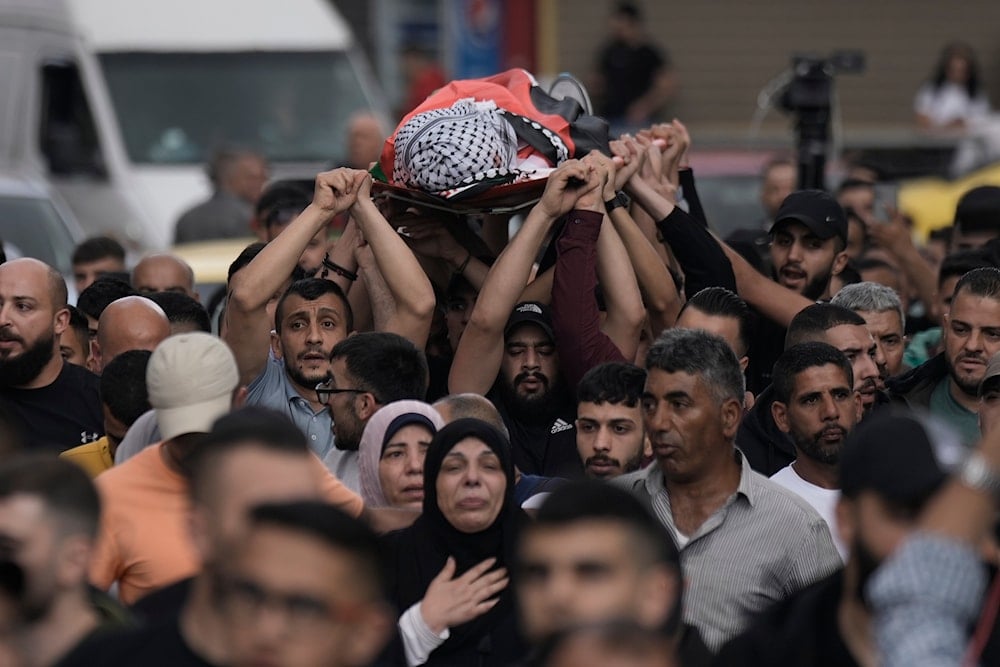Israeli settlers, forces make healthcare in West Bank hard to reach
A report by Doctors Without Borders shows through testimonies how violence against Palestinians is being instilled through the lack of health services.
-

Mourners carry the body of Samer Rumaneh, draped in a Palestinian flag, who was killed in an Israeli military raid, during his funeral in the West Bank city of Nablus, Sunday, May 12, 2024. (AP)
The extent and severity of violence in the occupied West Bank have been increasing exponentially – especially with the lack of health services and the long distances taken to reach medical care – inflicted by settlers and facilitated by the IOF.
A report by Doctors Without Borders (Médecins Sans Frontières) reflects on the situation via testimonies by residents starting with Mahmud Mousa Abu Eram, a Palestinian man from al-Khalil, who said, "We walk for hours to reach the health facilities. Sometimes we use the donkeys to transfer sick people to the hospital or to the clinic."
"There hasn't been transportation in this area for a long time, and even if there is a car to drop us to any clinic, the Israeli army confiscates the cars," he added.
The level of violence in the occupied town of Masafer Yatta has been instilling an increased amount of fear in Palestinian homes.
Read more: Life in the West Bank post October 7: Al Mayadeen Exclusive
An anonymous MSF patient said, "Most of the time it is forbidden to stand at the window. One day when I was standing at the window, a settler saw me and complained to the soldiers," adding, "The soldiers stormed my house and destroyed everything in it."
Last month, the report confirmed that a volunteer paramedic was shot in the Tulkarm and Nur Shams camps, and it took almost seven hours for him to reach the hospital. Meanwhile, a separate incident showed that MSF staff members were unable to save the life of a 16-year-old child after being shot in the head.
Itta Helland-Hansen, MSF project coordinator in Jenin, said, "His father, also a paramedic trained by MSF, learned the news of his son’s killing while working in the ambulance."
A medic from the al-Arrub refugee camp between al-Khalil and Beit Lahm said, "Most of the time, ambulances are blocked at checkpoints. Even in cases of medical emergencies and when we have the siren on," noting, "How long they stop us for does not depend on the medical emergency, it depends on the mood of the soldiers."
"They make us wait for one or two hours... Or they make us take another road. If the patient has a gunshot wound from the Israeli army, they can arrest the patient and even confiscate the ambulance. We don’t know what will happen to the patient then, if they will bring him to a hospital or to a prison and if he will receive medical care in the prison," he expressed.
Just this morning, violent confrontations took place between the Resistance and occupation forces raiding the western area of the city of Nablus, Palestinian media reported, pointing out that the occupation forces also stormed Tubas and Tulkarm in the occupied West Bank.
The Palestinian Ministry of Health announced that occupation bullets killed three Palestinians in Tulkarm: Ayman Ahmad Mubarak, Hossam Imad Dabas, and Mohammad Youssef Nasrallah.
According to a report last month by the Palestinian Prisoners' Affairs Commission and the Palestinian Prisoners Society, the number of detentions following Operation Al-Aqsa Flood rose to more than 8,165 in the West Bank, including those who were arrested from their homes, through military checkpoints, those who were forced to surrender under pressure, and those who were held hostage.
Israeli soldiers reportedly used three Palestinian children as human shields during violent raids in Tulkarm earlier this month, according to a Defense for Children International (DCI) report.
Read next: US sanctions may threaten future of West Bank settlements, but how?
The children were forced to walk in front of occupation forces as they raided the alleyways of the Nur Shams refugee camp and the homes of Palestinians in its vicinity.
According to a report, Israeli soldiers allegedly used two Palestinian children as human shields by placing rifles on their shoulders and firing shots in two incidents. Another child recounted how Israeli occupation forces separated him from his family during a raid on their apartment. Subsequently, he was coerced to knock on neighbors' doors, urging them to leave.

 4 Min Read
4 Min Read










